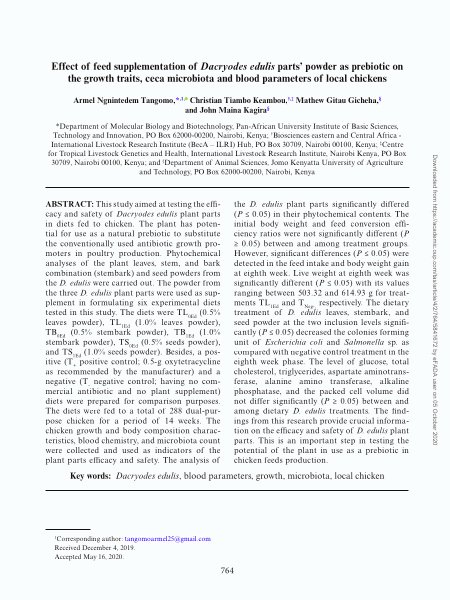Effect of feed supplementation of Dacryodes edulis parts’ powder as prebiotic on the growth traits, ceca microbiota and blood parameters of local chickens
Abstract
AbstractThis study aimed at testing the efficacy and safety of Dacryodes edulis plant parts in diets fed to chicken. The plant has potential for use as a natural prebiotic to substitute the conventionally used antibiotic growth promoters in poultry production. Phytochemical analyses of the plant leaves, stem, and bark combination (stembark) and seed powders from the D. edulis were carried out. The powder from the three D. edulis plant parts were used as supplement in formulating six experimental diets tested in this study. The diets were TL0Ed (0.5% leaves powder), TL1Ed (1.0% leaves powder), TB0Ed (0.5% stembark powder), TB1Ed (1.0% stembark powder), TS0Ed (0.5% seeds powder), and TS1Ed (1.0% seeds powder). Besides, a positive (T+ positive control; 0.5-g oxytetracycline as recommended by the manufacturer) and a negative (T- negative control; having no commercial antibiotic and no plant supplement) diets were prepared for comparison purposes. The diets were fed to a total of 288 dual-purpose chicken for a period of 14 weeks. The chicken growth and body composition characteristics, blood chemistry, and microbiota count were collected and used as indicators of the plant parts efficacy and safety. The analysis of the D. edulis plant parts significantly differed (P ≤ 0.05) in their phytochemical contents. The initial body weight and feed conversion efficiency ratios were not significantly different (P ≥ 0.05) between and among treatment groups. However, significant differences (P ≤ 0.05) were detected in the feed intake and body weight gain at eighth week. Live weight at eighth week was significantly different (P ≤ 0.05) with its values ranging between 503.32 and 614.93 g for treatments TL1Ed and TNeg-, respectively. The dietary treatment of D. edulis leaves, stembark, and seed powder at the two inclusion levels significantly (P ≤ 0.05) decreased the colonies forming unit of Escherichia coli and Salmonella sp. as compared with negative control treatment in the eighth week phase. The level of glucose, total cholesterol, triglycerides, aspartate aminotransferase, alanine amino transferase, alkaline phosphatase, and the packed cell volume did not differ significantly (P ≥ 0.05) between and among dietary D. edulis treatments. The findings from this research provide crucial information on the efficacy and safety of D. edulis plant parts. This is an important step in testing the potential of the plant in use as a prebiotic in chicken feeds production

